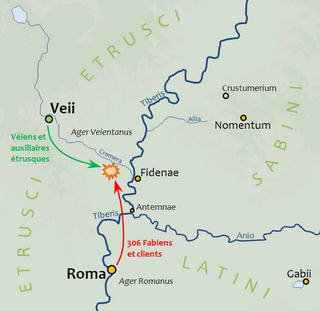Related Research Articles
Agrarian laws were laws among the Romans regulating the division of the public lands,or ager publicus. In its broader definition,it can also refer to the agricultural laws relating to peasants and husbandmen,or to the general farming class of people of any society.
Quintus Fabius Vibulanus,son of Marcus Fabius Vibulanus,was consul of the Roman Republic and one of the second set of decemviri.

Lucius Minucius Esquilinus Augurinus was a Roman politician in the 5th century BC,consul in 458 BC,and decemvir in 450 BC.

The Battle of the Cremera was fought between the Roman Republic and the Etruscan city of Veii,in 477 BC.
The Roman–Etruscan Wars were a series of wars fought between ancient Rome and the Etruscans. Information about many of the wars is limited,particularly those in the early parts of Rome's history,and in large part is known from ancient texts alone. The conquest of Etruria was completed in 265–264 BC.

The gens Cloelia,originally Cluilia,and occasionally written Clouilia or Cloulia,was a patrician family at ancient Rome. The gens was prominent throughout the period of the Republic. The first of the Cloelii to hold the consulship was Quintus Cloelius Siculus,in 498 BC.
Gnaeus Manlius Cincinnatus was the first of the patrician gens Manlia to obtain the consulship,which he held in 480 BC,together with Marcus Fabius Vibulanus. His father's name was Publius.
The gens Verginia or Virginia was a prominent family at ancient Rome,which from an early period was divided into patrician and plebeian branches. The gens was of great antiquity,and frequently filled the highest honors of the state during the early years of the Republic. The first of the family who obtained the consulship was Opiter Verginius Tricostus in 502 BC,the seventh year of the Republic. The plebeian members of the family were also numbered amongst the early tribunes of the people.
Caeso Fabius Vibulanus was consul of the Roman republic in 484,481,and 479 BC. He had earlier held the office of quaestor parricidii in 485 BC in connection with the trial and execution of Spurius Cassius Vecellinus.
Titus Sicinius (Sabinus?) or Siccius was a Roman Republican politician during the beginning of the 5th century BC. He served as Consul of Rome in 487 BC,serving together with Gaius Aquillius Tuscus.
The Roman-Aequian wars were a series of wars during the early expansion of ancient Rome in central Italy against their eastern neighbours,the Aequi.
Quintus Fabius Vibulanus was an aristocrat of the Early Roman republic. He was the first of three brothers to hold the consulate,in both 485 and 482 BC.
Lucius Aemilius Mamercus was a Roman statesman who served as consul three times:in 484,478 and 473 BC.
Titus Menenius Lanatus was a Roman patrician of the fifth century BC. He was elected consul for the year 477. He unsuccessfully fought the Veiientes,and was later prosecuted by the tribunes of the plebs for his failure to prevent the disaster of the Cremera.
Gaius Julius Iullus was a Roman statesman,who held the consulship in 482 BC. After a contentious election,he was chosen to represent the more moderate faction in Roman politics,while his colleague,Quintus Fabius Vibulanus,was elected by the aristocratic party. Both consuls led a Roman army against Veii,but withdrew when the Veientes refused to confront them. Thirty years later,in 451,Julius was chosen a member of the first decemvirate,alongside several other ex-consuls and other respected statesmen. Julius proved himself a man of good judgment and integrity,and helped to draw up the first ten tables of Roman law.
Titus Veturius Geminus Cicurinus was a Roman politician of the 5th century BC,consul in 462 BC and maybe decemvir in 451 BC.
Quintus Poetelius Libo Visolus was a Roman politician,and member of the Second Decemvirate in 450 and 449 BC.
Lucius Lucretius Tricipitinus was a Roman senator in the fifth century BC,and was consul with Titus Veturius Geminus Cicurinus in 462 BC.
Aulus Sempronius Atratinus was a consular tribune of the Roman Republic in 425,420,416 BC and possibly consul in 428 BC.
Quintus Fabius Vibulanus was a consul of the Roman Republic in 423 BC and a consular tribune in 416 and 414 BC.
References
- ↑ Robert Maxwell Ogilvie, Commentary on Livy, books 1–5, Oxford, Clarendon Press, 1965, pp. 404, 405.
- ↑ Livy, Ab urbe condita , 2.42-43
- ↑ Forsythe, A Critical History of Early Rome (Berkeley: University of California, 2005), p. 195
- ↑ Livy, 2.42
- ↑ Titus Livius, Ab Urbe Condita , ii. 45, 46.
- ↑ Titus Livius, Ab Urbe Condita , ii. 46, 47.
- 1 2 3 Titus Livius, Ab Urbe Condita , ii. 47.
- ↑ Dionysius of Halicarnassus, Romaike Archaiologia, ix. 5, 6, 11, 12.
- ↑ Paulus Orosius, Historiarum Adversum Paganos Libri VII ii. 5.
- ↑ Livy, 2.50; Dionysius of Halicarnassus, Roman Antiquities, 9.20-1